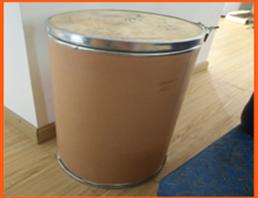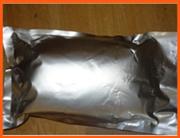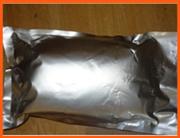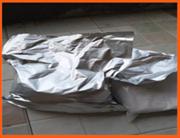L-Carnitine CAS :541-15-1
L-Carnitine MF:C7H15NO3
L-Carnitine Molecular Weight: 161.20
L-Carnitine EINECS: 208-768-0
L-Carnitine Product Categories: FINE Chemical & INTERMEDIATES;Miscellaneous;chiral;Amino Acids;Ammonium Polyhalides, etc. (Quaternary);Quaternary Ammonium Compounds;L-Carnitine Series;Vitamins and derivatives;Food Additives;Aliphatics;Amino Acids & Derivatives;Intermediates & Fine Chemicals;Pharmaceuticals;pharmaceutical chemicals;fine chemicals, specialty chemicals, intermediates, electronic chemical, organic synthesis, food additives, pharmaceuticals;chemical reagent;pharmaceutical intermediate;phytochemical;reference standards from Chinese medicinal herbs (TCM).;standardized herbal extract
L-Carnitine Mol File: 541-15-1.mol
| mp |
197-212 °C(lit.) |
| alpha |
-31 º (c=10, H2O) |
| refractive index |
-32 ° (C=1, H2O) |
| storage temp. |
2-8°C |
| solubility |
H2O: 0.1 g/mL at 20 °C, clear, colorless |
| Water Solubility |
2500 g/L (20 ºC) |
| Merck |
14,1849 |
| BRN |
4292315 |
| Stability: |
Hygroscopic |
| CAS DataBase Reference |
541-15-1(CAS DataBase Reference) |
L-Carnitine is synthesized primarily in the liver and also in the kidneys, and must be transported to other tissues. It is most concentrated in tissues that use fatty acids as their primary dietary fuel, such as skeletal and cardiac (heart) muscle. In this regard, L-carnitine plays an important role in energy production by chaperoning activated fatty acids (acyl-CoA) into the mitochondrial matrix for metabolism and chaperoning intermediate compounds out of the mitochondrial matrix to prevent their accumulation.
L-carnitine weight loss and performance, the effects:
Scientific literature shows that supplementation with L-carnitine on a daily basis increases the blood and muscular concentrations of this amino acid, enhancing fat metabolization and subsequent better performance.
Nevertheless, the researchers pointed out that muscle lactate was reduced when performing high-intensity exercise (at 80% VO2max).
This was not the first study to show that L-carnitine supplementation is able to reduce various markers of metabolic stress and of muscle soreness. Similar results were found by Spiering et. al. (2007) and Jacobs et. al. (2009).
WHEN SHOULD I TAKE L-CARNITINE
One of the best times to take L-carnitine is post-workout, but you can take it with any other high-carb, high-protein meal throughout the day. If you want to stack L-carnitine with other fat-burning ingredients between meals, consider using the acetyl-L-carnitine form.
One strategy I found to work well for both fat loss and performance is to take 2-3 doses of acetyl-L-carnitine with other fat-burning ingredients without food between meals, and to take 1 dose of L-carnitine or L-carnitine L-tartrate with a post-workout meal.
COA
| Product Name |
L-Carnitine(C7H15NO3) |
CAS: 541-15-1 |
| Items Tested |
Specification |
Result |
| Purity |
98.0~102.0% |
99.35% |
| Description |
White crystalline powder |
White crystalline powder |
| Identification A |
IR & NMR spectrum |
Confirm |
| Specific rotation |
-29.0o~-32.0o |
-31.08o |
| PH |
5.5~9.5 |
7.10 |
| Residue on ignition% |
≤0.5 |
0.08 |
| Water % |
≤4.0 |
0.19 |
| Heavy metals (ppm) |
≤10 |
≤10 |
| Arsenic (ppm) |
≤2 |
<1 |
| Chloride % |
≤0.4 |
<0.02 |
| Cyanamid (ppm) |
Non Detectable |
Non Detectable |
| Sodium % |
≤0.1 |
<0.1 |
| Potassium % |
≤0.2 |
<0.2 |
| Residue acetone% |
≤0.1 |
0.02 |
| Conclusion |
It complies to USP32 |
Know more about L-Carnitine
(1)L- carnitine is supplement our new approved the use of animal nutrition. Mainly used for reinforcement additive protein based, can promote the absorption and utilization of fat. D type and DL type no nutritional value. The use of 70-90mg/kg. 68gL- carnitine).
(2) L- carnitine is our country new approved the use of food supplements. Mainly used in the soy based infant food, promote fat absorption and utilization. D- type and DL- type no nutritional value. D- type and DL- type no nutritional value. Our country law can be used for biscuits, drinking liquor and beverage, use the weight of 600~3000mg/kg; On the solid beverage, oral liquid and capsule with 250 ~ 600mg/kg in milk powder; Used in the volume of 300 to 400mg/kg; In infant formula food use amount is 70 ~ 90mg/kg (L- carnitine meter, 1g tartaric acid salt is equivalent to 0.68gL- carnitine).
Application
L-Carnitine is an amino acid which has a role to play in the body's fat metabolism process. L-Carnitine transports fatty acids to the mitochondria, which is where they are essentially burned as fuel. This amino acid naturally occurs, although it can also be biosynthesized from two other ones. In addition to being found in a wide range of foods, it is also commonly available as a dietary supplement.



 China
China


